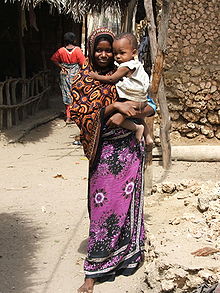Siyu is a settlement on the north coast of Pate Island, within the Lamu Archipelago in Kenya's Coast Province.
Siyu | |
|---|---|
 Siyu town at low tide. | |
| Country | Kenya |
| Province | Coast Province |
| Time zone | UTC+3 (EAT) |


The age of Siyu is not known, but it might date from the 13th century.[1]The first inhabitants of Siyu were Watikuu and Somali from Dondo and Burkao.[2]
There are some other accounts that mention Chinese ships of Zheng He's fleet sinking near Lamu Island in Kenya in 1415.[3] Survivors settled on the island and married local women. This has been proven recently by archaeological work on the island that has resulted in the finding of evidence to suggest this connection. Further DNA testing done on some residents from Siyu show that they indeed have Chinese ancestors.[4][5][6]
Gaspar de Santo Bernadino visited the town in 1606, and stated that it was the largest town on the island.[1]
Siyu's main claim to historical fame is that it through several battles withstood the sultans of Zanzibar. In 1843 the sheikh of Siyu, Bwana Mataka, and the new sheikh of Pate, repudiated the sovereignty of Seyyid Said, Sultan of Oman and Zanzibar. In response, Seyyid Said assembled an army consisting of 2000 people from Muscat, Baluchistan and Lamu. Leading them was his relative General Seyyid Hamad bin Ahmed Al-Busaidy, known as Amir Hamad. He had previously been Governor of Bandar Abbas (in 1824). He landed at Faza in early January 1844. On January the 6th they moved towards Siyu, but were ambushed and forced back to Faza. After three weeks without victory Amir Hamad sailed off.
In 1845 Siyu gave Seyyid Said one of his greatest military defeats. When Siyu finally succumbed to Zanzibar's dominance, under Sultan Majid in 1863, it was one of the last towns on the whole of East Africa's coast to do so.[7]
Siyu Fort is in interesting artefact in that it is a fort built by locals, not by foreigners. It is constructed of coral. Locals are known for their leather-craft.[8]
See also
editReferences
edit- ^ a b Martin, 1973, p. 23
- ^ Ylvisaker, Marguerite (1979). Lamu in the Nineteenth Century: Land, Trade, and Politics. African Studies Center, Boston University. p. 78.
- ^ Engel & Ramos 2013, p. 163.
- ^ Eliot 1966, p. 11.
- ^ "Kenyan girl with Chinese blood steals limelight". Chinese Embassy in Kenya. Archived from the original on May 8, 2013. Retrieved 3 April 2009.
{{cite web}}: CS1 maint: unfit URL (link) - ^ Kristof, Nicholas D. (6 June 1999). "1492: The Prequel". The New York Times. Retrieved 3 April 2009.
- ^ Martin, 1973, pp. 23–24
- ^ "Siyu Fort". National Museum of Kenya. Retrieved June 11, 2011.
Bibliography
edit- Eliot, Charles (1966). The East African Protectorate. Routledge. ISBN 0-7146-1661-3.
- Engel, Ulf; Ramos, Manuel João (17 May 2013). African Dynamics in a Multipolar World. BRILL. ISBN 978-90-04-25650-7.
- Martin, Chryssee MacCasler Perry and Esmond Bradley Martin: Quest for the Past. An historical guide to the Lamu Archipelago. 1973.
External links
edit- Media related to Siyu at Wikimedia Commons